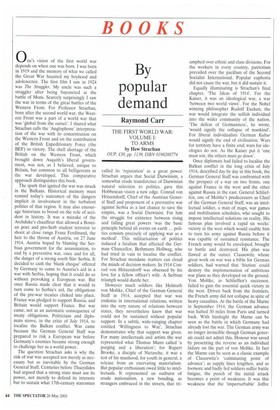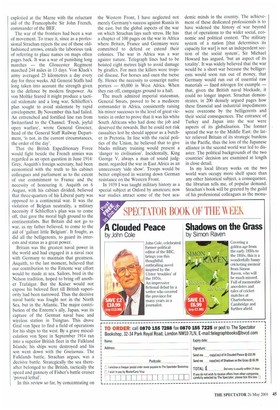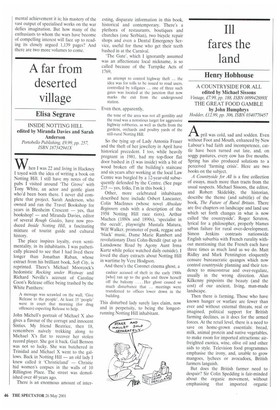By popular demand
Raymond Carr
THE FIRST WORLD WAR: VOLUME I: TO ARMS by Hew Strachan OUP, £30, pp. 1139, ISBN 0198208774 One's vision of the first world war depends on when one was born. I was born in 1919 and the memory of what we called the Great War haunted my boyhood and adolescence. The first film I saw in 1924 was The Straggler. My uncle was such a straggler after being bayoneted at the battle of Mons. Scarcely surprisingly I saw the war in terms of the great battles of the Western Front. For Professor Strachan, born after the second world war, the Western Front was a part of a world war that was 'global from the outset'. I shared what Strachan calls the 'Anglophone' interpretation of the war with its concentration on the Western Front and on the contribution of the British Expeditionary Force (the BEF) to victory. The shell shortage of the British on the Western Front, which brought down Asquith's liberal government, was not, as I believed, unique to Britain, but common to all belligerents as the war developed. This comparative approach distinguishes this book.
The spark that ignited the war was struck in the Balkans. Historical memory must remind today's statesmen of the dangers implicit in involvement in the turbulent politics of that region. It may also encourage historians to brood on the role of accident in history. It was a mistake of the Archduke's chauffeur that allowed a Bosnian poet and pro-Serb student terrorist to shoot at close range Franz Ferdinand, the heir to the throne of Austria, on 27 June 1914. Austria hoped by blaming the Serbian government for the assassination, to end by a preventive war, once and for all, the danger of a strong south Slav Serbia. It decided to cash the `blank cheque' offered by Germany to come to Austria's aid in a war with Serbia, hoping that it could do so without provoking a European war. But once Russia made clear that it would in turn come to Serbia's aid, the obligations of the pre-war treaties clicked into place. France was pledged to support Russia, and Britain would support France. But war came, not as an automatic consequence of treaty obligations. Politicians and diplomats strove, in the crisis of July 1914, to localise the Balkan conflict. War came because the German General Staff was prepared to risk a European war before Germany's enemies became strong enough to challenge her as a world power.
The question Strachan asks is why the risk of war was accepted not merely as necessary but as inevitable by the German General Staff. Centuries before Thucydides had argued that a strong state must use its power, not merely to defend its interests but to sustain what 17th-century statesmen called its 'reputation' as a great power. Strachan argues that Social Darwinism, a somewhat crude transference of Darwinian natural selection to politics, gave this Hobbesean vision a new edge. Conrad von Hotzendorff, Chief of the Austrian General Staff and proponent of a preventive war against Serbia as a last chance to save the empire, was a Social Darwinist. For him the struggle for existence between rising and falling great powers `was the basic principle behind all events on earth ... politics consists precisely of applying war as a method'. This militarisation of politics induced a fatalism that affected the German Chancellor, Bethmann Hollweg, who had tried in vain to localise the conflict. For Strachan mundane matters can cloud the minds of decision makers. In 1914 Conrad von Hotzendorff was obsessed by his love for a fellow officer's wife. A Serbian triumph would dazzle her.
However much soldiers like Helmuth von Moltke, Chief of the German General Staff in 1914, accepted that war was endemic in international relations, written into the very nature of relations between states, they nevertheless knew that war could not be sustained without popular support. In a subtle, wide-ranging chapter entitled 'Willingness to War', Strachan demonstrates why that support was given. For many intellectuals and artists the war represented what Thomas Mann called `a purging and a liberation'; for Rupert Brooke, a disciple of Nietzsche, it was a test of his manhood, for youth in general, a release from an enervating materialism. But popular enthusiasm owed little to intellectuals. It represented an outburst of crude nationalism, a new bonding, as strangers embraced in the streets, that tri umphed over ethnic and class divisions. For the workers in every country, patriotism prevailed over the pacifism of the Second Socialist International. Popular euphoria did not cause the war, but it did sustain it.
Equally illuminating is Strachan's final chapter, 'The Ideas of 1914'. For the Kaiser, it was an ideological war, a war 'between two world views'. For the Nobel winning philosopher Rudolf Eucken, the war would integrate the selfish individual into the wider community of the nation. `The defeat of Germanness', he wrote, 'would signify the collapse of mankind'. For liberal individualists German Kultur would signify the end of civilisation. Wars for territory have a finite end; wars for ideologies do not. As the Kaiser put it 'one must win, the others must go down'.
Once diplomats had failed to localise the Balkan conflict in the long crisis of July 1914, described day by day in this book, the German General Staff was confronted with the prospect of a war on two fronts, one against France in the west and the other against Russia in the east. General Schlieffen, one of Moltke's predecessors as Chief of the German General Staff, was an intellectual soldier, a man of maps, war games and mobilisation schedules, who sought to impose intellectual solutions on reality. His famous plan involved a rapid six weeks' victory in the west which would enable him to turn his army against Russia before it was capable of sustained resistance. The French army would be enveloped, brought to battle and destroyed. His plan was flawed at the outset. Clausewitz, whose great work on war was a bible for German soldiers, had warned that 'friction' could destroy the implementation of ambitious war plans as they developed on the ground. Von Moltke, as Schlieffen's successor, failed to gain the essential quick victory in the west. Driven back from the frontiers, the French army did not collapse in spite of heavy casualties. At the battle of the Marne in September 1914, the German advance was halted 30 miles from Paris and turned back. With hindsight the Mame can be seen as the battle in which Germany had already lost the war. The German army was no longer invincible though German generals could not admit this. Honour was saved by presenting the reverse as an individual failure on the part of von Moltke. In fact the Marne can be seen as a classic example of Clausewitz's 'culminating point of advance'; as supply lines lengthen, and as footsore and badly fed soldiers suffer battle fatigue, the punch of the initial attack becomes a point of weakness. It was this weakness that the 'imperturbable' Joffre exploited at the Marne with the reluctant aid of the Francophobe Sir John French, commander of the BEF.
The war of the frontiers had been a war of movement. To trace it, since as a professional Strachan rejects the use of those oldfashioned arrows, entails the laborious task of referring to place names on maps often pages back. It was a war of punishing long marches — the Gloucester Regiment marched 244 miles in 13 days. Von Kluck's army averaged 23 kilometres a day every day for three weeks. All General Staffs had long taken into account the strength given to the defence by modern firepower. As von Moltke feared it might produce a tactical stalemate and a long war, Schlieffen's plan sought to avoid stalemate by rapid envelopment. By November this had failed. An entrenched and fortified line ran from Switzerland to the Channel. 'Fresh, joyful open warfare', wrote General Groener, head of the General Staff Railway Department. 'is not, in the current circumstances, the order of the day'.
That the British Expeditionary Force would fight beside the French armies was regarded as an open question in June 1914: Grey, Asquith's foreign secretary, had been economical with the truth to his cabinet colleagues and parliament as to the extent of our commitment to France and the necessity of honouring it. Asquith on 6 August, with his cabinet divided, believed that three-quarters of his Liberal party was opposed to a continental war. It was the violation of Belgian neutrality, a military necessity if Schlieffen's plan was to come off, that gave the moral high ground to the continentalists. But Britain did not go to war, as my father believed, to come to the aid of 'gallant little Belgium'. It fought, as did all the belligerents, to guard its interests and status as a great power.
Britain was the greatest naval power in the world and had engaged in a naval race with Germany to maintain that greatness. Asquith, to the last moment, believed that our contribution to the Entente war effort would be made at sea. Sailors, bred in the Nelson tradition, hoped to bring off another Trafalgar. But the Kaiser would not expose his beloved fleet till British superiority had been narrowed. Thus the decisive naval battle was fought not in the North Sea, but in the Atlantic. The major contribution of the Entente's ally, Japan, was its capture of the German naval base and wireless station in Tsingtao. This drove Graf von Spee to find a field of operations for his ships to the west. By a grave miscalculation von Spee in September 1914 ran into a superior British fleet in the Falkland Islands; his ships were destroyed and his son went down with the Gneisenau. The Falklands battle. Strachan argues, was a decisive battle. Strategically the sea thereafter belonged to the British, tactically the speed and gunnery of Fisher's battle cruiser 'proved lethal'.
In this review so far, by concentrating on the Western Front, I have neglected not merely Germany's success against Russia in the east, but the global aspects of the war on which Strachan lays such stress. He has a chapter of 100 pages on the war in Africa where Britain, France and Germany were committed to defend or extend their colonies. The war in Africa was a war against nature. Telegraph lines had to be hoisted eight metres high to avoid damage by giraffes. For men the killers were tropical disease. For horses and oxen the tsetse fly. Hence the necessity to conscript native porters — 80,000 in West Africa. When they ran off, campaigns ground to a halt.
The much admired imperial statesman, General Smuts, proved to be a mediocre commander in Africa, consistently raising his minor successes to the level of great victories in order to prove that it was his white South Africans who had done the job and deserved the rewards. But he could not risk casualties lest he should appear as a butcher in Pretoria. In line with the racial politics of the Union, he believed that to give blacks military training would present a 'danger to civilisation'. Incidentally, King George V, always a man of sound judgment, regarded the war in East Africa as an unnecessary 'side show'. Troops would be better employed in wearing down German resistance on the Western Front.
In 1939 I was taught military history as a special subject at Oxford by amateurs; now war studies attract some of the best aca
demic minds in the country. The achievement of these dedicated professionals is to have widened the history of war beyond that of operations to the wider social, economic and political context. 'The military system of a nation [that determines its capacity for war] is not an independent section of the social system', Sir Michael Howard has argued, 'but an aspect of its totality'. It was widely believed that the war would be a short war because the belligerents would soon run out of money, that Germany would run out of essential raw materials — fixed nitrogen for example — that, given the British naval blockade, it could no longer import. Strachan demonstrates, in 200 densely argued pages how these financial and industrial impediments were overcome by the belligerents and their social consequences. The entrance of Turkey and Japan into the war were aspects of its globalisation. The former spread the war to the Middle East: the latter relieved Britain of its strategic burdens in the Pacific, thus the loss of the Japanese alliance in the second world war led to disaster. The political backgrounds of the two countries' decision are examined at length in close detail.
In my local library works on the two world wars occupy more shelf space than any other historical subject, a consequence, the librarian tells me, of popular demand. Strachan's book will be greeted by the guild of his professional colleagues as the monu mental achievement it is; his mastery of the vast output of specialised works on the war defies imagination. But how many of the enthusiasts to whom the wars have become of compelling interest will face up to reading its closely argued 1,139 pages? And there are two more volumes to come.




















































































 Previous page
Previous page